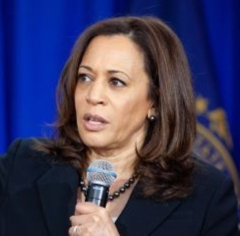
The United States' presidential election is one of the most closely watched political events around the world, and for good reason. The elected president's policies and decisions have far-reaching implications, not just for the U.S., but for its territories and allies worldwide. Among these territories is Guam, a strategically pivotal island in the Western Pacific.
As we approach another election cycle, it's crucial to examine how the potential outcomes—whether a Democratic or Republican victory—could impact Guam in various dimensions, including social services, defense, and international relations.
When assessing the potential effects of a Democratic administration, several factors come into play, notably the party’s historical stances and recent policy proposals. The Democratic Party has traditionally advocated for increased federal funding for social and public welfare programs.
For Guam, where access to quality healthcare and education remains a pressing issue, the continuation or expansion of such policies would be highly beneficial.
According to the Guam Department of Public Health and Social Services' 2019 report, about 25 percent of the island's population relies on government healthcare programs like Medicaid. The administration that prioritizes healthcare funding could help alleviate some of these burdens, ensuring better medical services for Guamanians.
In addition to healthcare, education is another critical area where Democratic policies could bring about positive change. According to the National Center for Education Statistics, Guam faces challenges including higher dropout rates and lower academic performance compared to some U.S. states.
Increased federal funding for education, which Democrats often champion, could provide the necessary resources for educational reforms, infrastructure improvement, and teacher training. Thus, the educational opportunities available to young Guamanians could see a significant uplift under a Democratic administration.
Climate change is another domain where Democratic policies could make a substantial impact on Guam. The island is highly vulnerable to climate-induced phenomena such as rising sea levels and extreme weather events. According to the Fourth National Climate Assessment published in 2018, sea levels around Guam are projected to rise by as much as 1.1 feet by 2050 under current emission trajectories. Such changes pose a direct threat to the island's infrastructure and way of life.
A Democratic administration, which generally makes environmental protection and climate resilience a priority, could funnel more federal resources into bolstering Guam’s defenses against these threats. This could include funding for building seawalls, improving drainage systems, and upgrading other critical infrastructure to withstand natural disasters.
On the geopolitical front, Democrats often favor a multilateral approach in foreign policy. Guam's strategic location in the Asia-Pacific region makes it an essential asset in maintaining regional stability and security.
A Democratic administration's emphasis on diplomacy and coalition-building could enhance Guam's stature by fostering stronger ties with allies such as Japan, South Korea, and Australia. These relationships would not only improve military coordination and preparedness but also benefit Guam economically through increased collaborative ventures and investments.
Conversely, a Republican administration brings a different set of priorities and implications for Guam. Historically, the Republican Party has placed a strong emphasis on national security and military strength. Given Guam’s role as a critical hub for U.S. military operations in the Asia-Pacific, including the presence of Andersen Air Force Base and Naval Base Guam, increased defense spending under a Republican administration would likely lead to more resources and infrastructural developments on the island.
According to the Department of Defense, the 2020 military budget allocated substantial funds for the Indo-Pacific region, of which Guam is a crucial part. Such investments could lead to improved facilities, better logistical support, and increased local employment opportunities.
However, the focus on military spending could come at the expense of social programs and environmental protections. Republicans often advocate for reduced government spending in areas deemed non-essential, which could include social welfare programs that many Guamanians rely on.
According to the 2021 federal budget, proposed by a then-Republican administration, significant cuts were aimed at Medicaid and other social services. Reduced funding in these areas could place additional strain on Guam's local government, which already grapples with limited resources.
Economically, Republicans tend to favor deregulation and tax reforms aimed at spurring business growth. For Guam, this could lead to increases in foreign investments and business activities, particularly in sectors like tourism and real estate. However, the benefits might be unevenly distributed, exacerbating existing social inequalities.
Additionally, an administration that deprioritizes environmental regulations could pose significant risks to Guam's ecosystem, which is already under threat from climate change.
From a foreign policy perspective, Republicans often adopt a more unilateral and assertive stance. This could mean an increased military presence on Guam, which serves as a forward base for U.S. operations in the region. While this might enhance Guam's strategic value, it could also escalate tensions with neighboring countries, making the island a potential target in geopolitical conflicts.
For instance, China has already expressed concerns over the U.S. military presence in the region, and further militarization could heighten these tensions.
In conclusion, the upcoming U.S. presidential election holds profound implications for Guam.
As Guam navigates these potential changes, it is crucial for the island’s residents and leaders to stay informed and advocate for policies that balance immediate needs with long-term sustainability.
Regardless of the outcome, Guam’s destiny remains intrinsically tied to the decisions made in Washington, D.C., underscoring the importance of this significant political event.
Abdul Rafay Afzal is the editor-in-chief of the international magazine The Advocate Post. Afzal is a law student from Pakistan. He writes for different publications in 12 countries. Send feedback to rafayafzal555@gmail.com. Follow him on
Instagram: @arafzal555
The opinions expressed in this op-ed piece are solely the author's and don't necessarily reflect the Pacific Island Times' editorial position.
Subscribe to
our digital
monthly edition







Comments